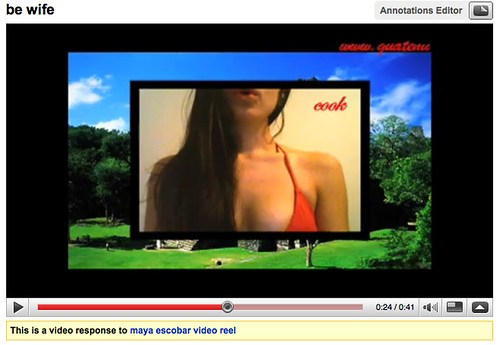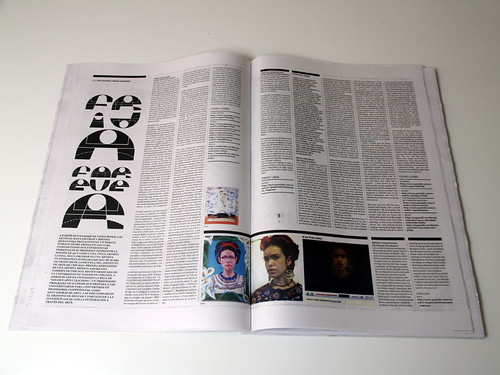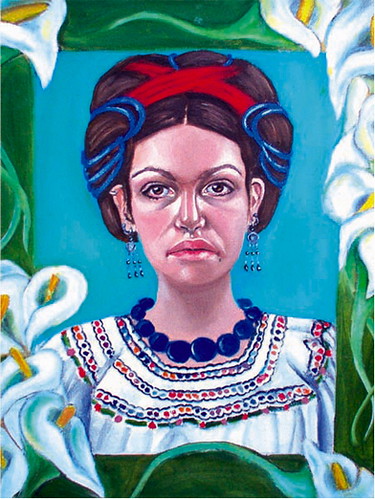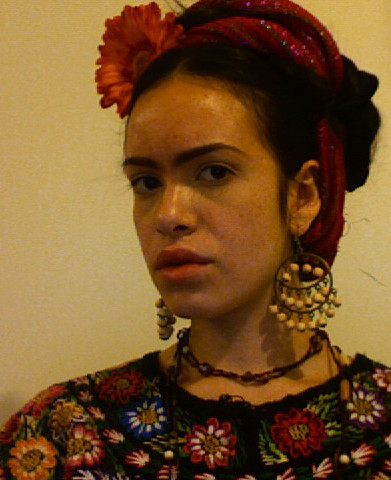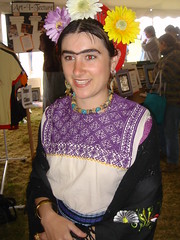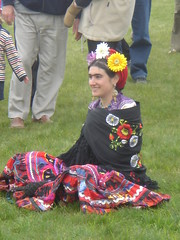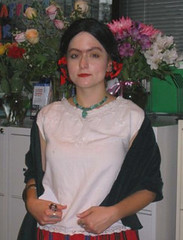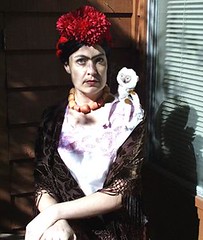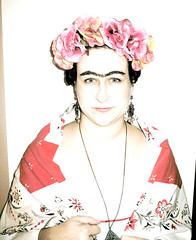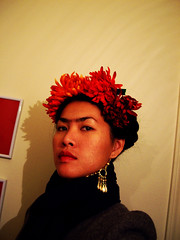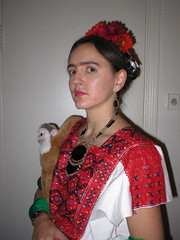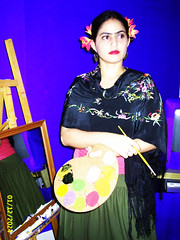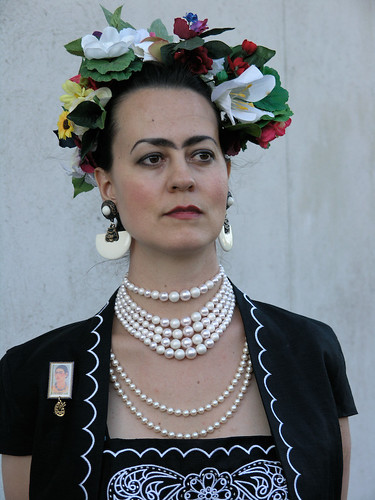In October of 2006 my rabbi started blogging. While trying to comment on one of his posts, I accidentally registered my own blog. Within hours of posting a comment, my name began appearing in Google searches. I was now linked to the post I had commented on, previous posts my rabbi had written, comments left by other users and the posts they had written elsewhere within the blogosphere. The rapidity with which I was branded, not only by my own online activity, but also by the online activity of others, seemed incomprehensible.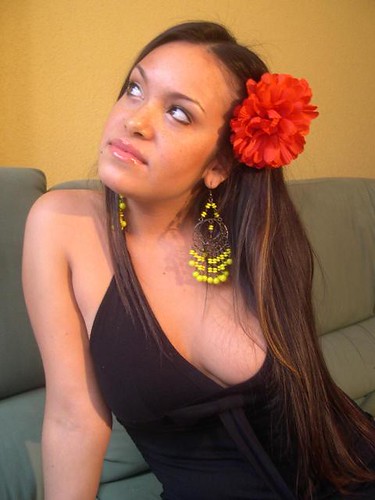 I thought about this phenomenon in relationship to, the images that my friends and I had posted on Myspace throughout that year. I unknowingly went from being slightly annoyed and simultaneously amused by the phrase "take a picture of me for my Myspace", to it becoming completely natural and almost organic to document every moment, every outing, every time my friends and I put on make up, and to take pictures for Myspace. I saw this behavior even further exaggerated in the high school students I was student teaching. Their conversations were dominated with events that had transpired on Myspace, and when they were not talking about Myspace they were taking pictures for Myspace.When we talked about the factors that contributed to the construction of their individual and collective identities, my students were quick to bring up their style of dress, group of friends, the neighborhood they lived in, and the way they spoke. Yet not a single student referenced their online activity, the pictures they posted, the groups they joined, the comments they left on each others pages. I wondered why it was, that they were so aware of and adept at reflecting upon their experiences in the material offline world, but failed to mention the social network that played such a major role in their day-to-day lives.DECONSTRUCTING PERSONAL IDENTITY
I thought about this phenomenon in relationship to, the images that my friends and I had posted on Myspace throughout that year. I unknowingly went from being slightly annoyed and simultaneously amused by the phrase "take a picture of me for my Myspace", to it becoming completely natural and almost organic to document every moment, every outing, every time my friends and I put on make up, and to take pictures for Myspace. I saw this behavior even further exaggerated in the high school students I was student teaching. Their conversations were dominated with events that had transpired on Myspace, and when they were not talking about Myspace they were taking pictures for Myspace.When we talked about the factors that contributed to the construction of their individual and collective identities, my students were quick to bring up their style of dress, group of friends, the neighborhood they lived in, and the way they spoke. Yet not a single student referenced their online activity, the pictures they posted, the groups they joined, the comments they left on each others pages. I wondered why it was, that they were so aware of and adept at reflecting upon their experiences in the material offline world, but failed to mention the social network that played such a major role in their day-to-day lives.DECONSTRUCTING PERSONAL IDENTITY (today) I am referring to myself as a performance artist, Internet curator, and editor. I create and (concurrently) perform multiple online identities, by sampling from different representations of existing cultural discourses. I fragment my personal experiences and invite others to join in, and modify and regroup those fragments. By doing this I hope to share the process through which I deconstruct and reconstruct my individual conception of self, so that others can do the same in their lives.In the series Acciones Plásticas I performed representations of five constructed characters: a religious Jewish woman, a spoiled Jewish girl, a ghetto Latina, a sexy Latina professor, and a Mayan woman. I created low quality YouTube video blogs for four of the characters, the Mayan woman did not have a video, as she would not have had access to YouTube technologies. The videos were strategically placed on popular social networking sites, including YouTube and MySpace. The layout of YouTube contextualized the videos and framed them with user comments and similarly tagged user content. Jewish Girls was picked up by a popular left-wing Jewish blogging site Jewschool, and soon entered the Jewish Blogosphere where it was referred to as the JAP. This repositioning shifted the focus from the portrayal of multiple interwoven identities to a depiction of the Jewish American Princess. The JAP became how people knew my work, validating me while simultaneously conflating my identity with that of this particular character.
(today) I am referring to myself as a performance artist, Internet curator, and editor. I create and (concurrently) perform multiple online identities, by sampling from different representations of existing cultural discourses. I fragment my personal experiences and invite others to join in, and modify and regroup those fragments. By doing this I hope to share the process through which I deconstruct and reconstruct my individual conception of self, so that others can do the same in their lives.In the series Acciones Plásticas I performed representations of five constructed characters: a religious Jewish woman, a spoiled Jewish girl, a ghetto Latina, a sexy Latina professor, and a Mayan woman. I created low quality YouTube video blogs for four of the characters, the Mayan woman did not have a video, as she would not have had access to YouTube technologies. The videos were strategically placed on popular social networking sites, including YouTube and MySpace. The layout of YouTube contextualized the videos and framed them with user comments and similarly tagged user content. Jewish Girls was picked up by a popular left-wing Jewish blogging site Jewschool, and soon entered the Jewish Blogosphere where it was referred to as the JAP. This repositioning shifted the focus from the portrayal of multiple interwoven identities to a depiction of the Jewish American Princess. The JAP became how people knew my work, validating me while simultaneously conflating my identity with that of this particular character.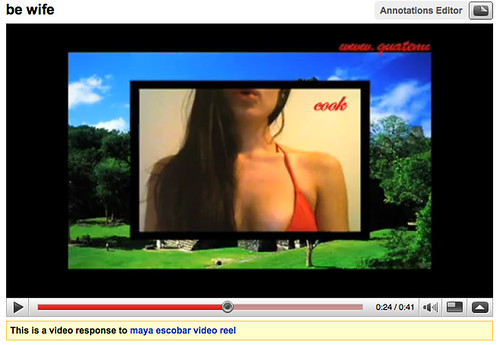 One of the strategies that I employed to counteract idea of "me as The JAP" was to group videos from the series Acciones Plásticas together with three other Youtube videos in a video reel of my work. The first video in the reel, el es frida kahlo is me dressed as Frida Kahlo where I violently scream I am Frida Kahlo! In second video Be Wife, I wear a bright red bikini top in front of an image of a Mayan temple in Tikal. Traditional Guatemalan marimba music plays in the background, while red text scrolls across the top reading Guatemala's finest export. The third video Que Sencilla, features me as a little girl, who is being coaxed by an off-camera male voice to perform a dance for the camera.Someone who is expecting to see a Jewish American Princess, is instead greeted with an enraged
One of the strategies that I employed to counteract idea of "me as The JAP" was to group videos from the series Acciones Plásticas together with three other Youtube videos in a video reel of my work. The first video in the reel, el es frida kahlo is me dressed as Frida Kahlo where I violently scream I am Frida Kahlo! In second video Be Wife, I wear a bright red bikini top in front of an image of a Mayan temple in Tikal. Traditional Guatemalan marimba music plays in the background, while red text scrolls across the top reading Guatemala's finest export. The third video Que Sencilla, features me as a little girl, who is being coaxed by an off-camera male voice to perform a dance for the camera.Someone who is expecting to see a Jewish American Princess, is instead greeted with an enraged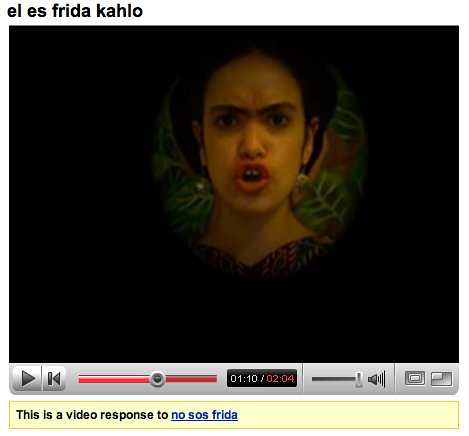 Latina artist, trying to fight the stigma of being associated with Frida Kahlo. My inclusion of these additional videos was to show the multidimensionality of the five characters initially presented in Acciones Plásticas. The Mayan women does not have her own YouTube video, but with the addition of the Be Wife video, her absence is felt even greater. The face of Guatemala in these videos, is the chest of a mail order bride. Another example can be seen within the four original videos themselves. With the grouping of the ghetto latina with the sexy latina professor, vast cultural and class difference can be seen between the two representations of Latina women. Put together with el es frida kahlo and Be Wife, there are suddenly five Latina performers all acting on one stage.
Latina artist, trying to fight the stigma of being associated with Frida Kahlo. My inclusion of these additional videos was to show the multidimensionality of the five characters initially presented in Acciones Plásticas. The Mayan women does not have her own YouTube video, but with the addition of the Be Wife video, her absence is felt even greater. The face of Guatemala in these videos, is the chest of a mail order bride. Another example can be seen within the four original videos themselves. With the grouping of the ghetto latina with the sexy latina professor, vast cultural and class difference can be seen between the two representations of Latina women. Put together with el es frida kahlo and Be Wife, there are suddenly five Latina performers all acting on one stage.
Nuevos Compañeros 2
Please Check for updates, as I continue to add more to this post.Dianna Montano Dianna Montano is currently finishing her BFA in sculpture/ installation/ new media art at Colorado State Univeristy in Albuquerque, NM.When I found her Ay Chico (Lengua Afuera) Music Video, on youtube I immediately contacted her and asked her if she would be interested in collaborating. She gladly agreed, so I am introducing her work as continuation to theNuevos Compañeros post.[youtube=http://www.youtube.com/watch?v=IGa3HK_tVBg]Dianna says:
Critiquing the onslaught of perversion, and obsession of Latina women. This video subverts the stereotype, by overtly portraying what is all too prevalent in mainstream culture. Latina women are poised as nothing more than sex objects. With this, the woman literally becomes the "spicy latina" everyone desires. It also relates to how Latina women deal with the stereotypes and expectations that are imposed by sources such as family, religion, and the media. For Latinas, sexual power is in constant conflict.
Below is an installation shot of her piece: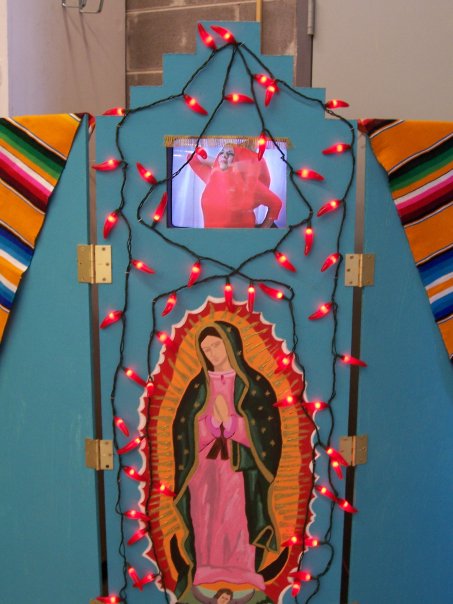 My "Spicy Latina" piece in its full glory. It doesn't get any better than chili pepper lights, Mexican sarape blankets, a traditional Virgin de Guadalupe, and a gold dangly. ay ay ay!!Check out this post Identity Issues Affecting Puerto Rican Girls: An Artist Speaks to hear more on the Spicy Latina.
My "Spicy Latina" piece in its full glory. It doesn't get any better than chili pepper lights, Mexican sarape blankets, a traditional Virgin de Guadalupe, and a gold dangly. ay ay ay!!Check out this post Identity Issues Affecting Puerto Rican Girls: An Artist Speaks to hear more on the Spicy Latina.
I have been told “Oh you just look like you like to have sex” (by both men and women.) I have come to expect this as the norm: being called a spicy latina, hot tamale, firecracker and other such fiery terms. Cofer states that “advertisers have designated “sizzling” and “smoldering” as the adjectives of choice for describing not only the foods but the women of Latin America.”
Maya Escobar isn't even Jewish
UPDATE: PHOTOS
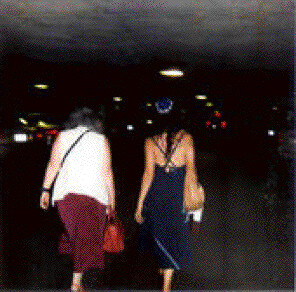 On an almost daily basis, I receive emails from people asking if I am in fact actually Jewish. Although I do find it somewhat bizarre that they find satisfaction in my acknowledgment of what I have already stated numerous times, I usually respond. Come to think of it, the occasions where I have been accepted as a Jew (without further questioning) have been few and far between.
On an almost daily basis, I receive emails from people asking if I am in fact actually Jewish. Although I do find it somewhat bizarre that they find satisfaction in my acknowledgment of what I have already stated numerous times, I usually respond. Come to think of it, the occasions where I have been accepted as a Jew (without further questioning) have been few and far between.
- “ No you can’t be Jewish you are Hispanic”
- “You don’t look Jewish”
- “Escobar… is that a Sephardic name?”
Recently I discovered that without our knowledge, the validity of my own and my brother Gonzalo’s Jewishness has come into question (to the point where documentation has been requested) from people that we are now very close with.Below are some of the examples of comments (not emails, I do not share the content of emails without permission) from youtube:
roundedwhtcollar Am I the only one who thinks this reprobate Turd is NOT in fact a Jew? Rafaelpicc But is her las name jewish? or converted? ReptorY her last name isnt jewish. xruchy you are not jewish i guess... tus videos= cero aporte raquelita40 she's half Jewish/ half Guatemalan.nakedjanet i am also suspicious. for one thing, escobar is not a typical Jewish name. For another, Jewish girls are usually a whole lot smarter, and have a whole lot more substance, than this girl has
(from chaptzem blogspot) There is no way she is Jewish- there may be a small chance her family are anusim or something.But what gets even more bizarre is that interspersed with in those comments are horrible anti-semitic statements:
johnnycastle86xx all the jews have to die, stupid jewish puta de mierda. Que mierda que Hitler no mato a tu familia, asi tu no hubieras nacido. muerte a los judios y muerte a israel. mocrostyle3600 AnotherJewish nasty bitchmrrimfire She's an ugly cockroachfilet there's a nice Jewishcrew- club... Its re-open and called Auschwitz. the drinks are on the house!!! but only for jewish people roshanpinto13 i want to put you in a concentration camp bitch if your people want israel so bad why don’t you go there and rid the world from your hideous jewish ways
So in light of my sarcasric sense of humor I entitled this post : Maya Escobar isn’t even Jewish I wonder what will come of that statement... From Judaism 101: Who Is a Jew?
First, traditional Judaism maintains that a person is a Jew if his mother is a Jew, regardless of who his father is. The liberal movements, on the other hand, consider a person to be Jewish if either of his parents was Jewish and the child was raised Jewish. Thus, if the child of a Jewish father and a Christian mother is raised Jewish, the child is a Jew according to the Reform movement, but not according to the Orthodox movement. On the other hand, if the child of a Christian father and a Jewish mother is not raised Jewish, the child is a Jew according to the Orthodox movement, but not according to the Reform movement! The matter becomes even more complicated, because the status of that children's children also comes into question.
In my case my mother is Jewish and my father is not. Yet it is my father that pushed me to go to Hebrew school until I was 16. Rain or shine my parents have been attending Shabbat services at JRC for almost 20 years. I remember being so mad as a child that my friends got to go out on Friday nights, and I was stuck with my family not even allowed to watch TV when we got home from services. Vickie Korey left the nicest comment on my Rabbi Brant Rosen’s blog:
I remember Maya at Friday night services at JRC, sometimes listening intently, sometimes reading, but always being present. When one of the children of our extended spiritual family grows to be such a fine, thoughtful and accomplished young woman we are all proud. Gonzolo and Tina have worked hard to set a strong foundation for Maya and I am so pleased for her and her family.
A few months ago I met with my Rabbi to discuss my (art) work. During our discussion I mentioned to him how my father is feeling really nervous about me having an orthodox wedding where he will not be included in the ceremony. Brant said something to me that really touched my heart. Your father is the essence of what a Jew is, he is a stranger in a strange land. I agree with him whole-heartedly, and if you ask most JRC members I am sure they would agree as well. However that does not change the fact that he is not considered to be Jewish by our neighbors, and even if he converted, to them it would not be halakhic unless he went through orthodox conversion. So who is a Jew? Who determines this?As I stated in a previous post I will be working as the art director this summer for Camp JRF. I am in the process of creating this summer’s curriculum that will be geared towards answering these very questions and challenging notions of Jewish Identity. Below is a very rough sketch of my plan…. (Please let me know if you have any suggestions, or would be interested in contributing any resources) The Changing Face of Jewish Identity: an exploration of self and what it means to be a Jew in our contemporary societyTo introduce the concept of a changing Jewish Identity will discuss the following:
- How do we define ourselves/ how do others define us?
- Who is a Jew?
- Can someone be more or less Jewish/ who decides this?
- What is our role in society?
- What characteristics make up a Jew?
Mediums Mixed media sculpture Art Exhibitions The Jewish Identity Project Too Jewish Challenging Tradition Identities Written Works by Ilan Stavans Achy Obejas Rebecca Walker Campers will produce mixed media sculptures that reflect their perception of what it means to be a JewPre- Activities:
- We will begin as an ice breaker/ intro to project identifying the characteristics that make up Jews.
- Followed by a discussion on contemporary representations of Jews in Popular culture
Project Campers working in groups of 3-4 will have the option of creating either abstract or representational mixed media sculptures that to them represent Jewish identity. Prior to the construction of their piece students will need to create a (flexible) proposal that outlines their piece.
- Will it be site specific (interact with a certain location)?
- What form will it take?
- Will it have a function?
- What materials will be used based on the above?
If they end up going with more representational sculptures I thought it would be really cool to photograph the sculptures and to place them in various Jewish settings and non-Jewish settings (baseball stadium, temple, Shabbat dinner, work, school....)
Identity Issues Affecting Puerto Rican Girls: An Artist Speaks
In her essay The Myth of the Latina Woman/ Just Met a Girl Named Maria, Judith Ortiz Cofer describes her Puerto Rican upbringing in a strict Catholic home in New Jersey, where she was taught to behave like a proper señorita. Cofer explains that the conflicting messages she received as a child, were those commonly propagated by Puerto Rican mothers. “They encourage their daughters to look and act like women and to dress in clothes that our Anglo friends and their mothers found to mature for our age.”When the mere notion of latinidad equates passion and sexuality to gringos, why is it that Latino men are the first ones to point finger and to call these same women suelta (loose) or facil (easy)? Wouldn’t they understand? Have they not been subjected to the same treatment? Perhaps it is comes down to the way they were raised.In the Latino culture ideas of masculinity and femininity are delineated very early on. Author Evelyn P. Stevens, first introduced this concept know as machismo and marianismo in 1973. Machismo grants supreme authority of the man over the woman. Under this doctrine women, who are considered to be morally and spiritually superior to men are able to endure abuse. They grow up expected to follow the sexual code of marianismo, and are submissive to the man’s authority.Puerto Rican culture places women into one of two categories the virgin or the whore; mujeres de la casa (women of the home) or mujeres de la calle (women of the street). Una mujer de la casa, is expected to be pure, giving and compassionate. While, una mujer de la calle is considered to be sluty, wild, and dangerous.In Honor and the American Dream: Culture and Identity in a Chicano Community, author Ruth Horowitz says the following:The very presence of a woman outside the household implicates them in promiscuity and/or sexual misconduct. Puerto Rican girls learn this good girl/bad girl dichotomy most clearly in the recruitment into reproductive labor… A good girl cooks, cleans, takes care of younger siblings, and helps her parents. In contrast una muchacha de la calle is a transgressive women who has gone beyond patriarchal control whose sexuality is unbounded and therefore dangerous.While in Puerto Rico this January, I had the privilege of meeting the incredibly talented video artist, Tamara Liz Rivera Boria. Tamara and I instantly bonded, finding similarity in the content of our work, and decided that we needed to collaborate.I conducted a short series of interviews with her (documented with the camera from my laptop), where she describes her work as it plays on the screen behind her…[youtube=http://www.youtube.com/watch?v=I2SdDl2zaus] click on above image to view videoInterview with Puerto Rican Artist Tamara Liz Rivera BoriaMaya: Tamara, what can you tell me about muchachas de la calle and muchachas de las casa?Tamara: De la casa and de la calle girls might as well be related. They exchange roles sometimes, de la casa girl wanting to be de la calle, and vice versa.Maya: How has this affected you?Tamara: I was raised in a catholic home, in a catholic school. I can tell you, I have been fucked up. I didn’t want to be told what to do, or what to believe in.How can you tell someone that using a condom is a sin? I had many issues over the years being raised like that. Even though my parents are not Catholic extremists. They were pretty easy going that’s how they could understand me or deal with me. Deep inside it made a mark, no matter how much I tried to live and understand the world. I became insane trying to understand other people lifestyle because indeed I might have been raised inside a bubble. I still am kind of in there, don’t wanting to look at how things really are.Maya: What role does your cultural upbringing play in your work?Tamara: Recently I made a video called él, baño de marîa. In this video I present various symbolism about religion, pecados (sins), sexuality, purity, faith among other things. Mainly because our culture has raised us thinking inside the box, controlling us with Christianity, especially Catholicism. Being pure, waiting till marriage although most don’t do it, is deep inside the mind. Like it is wrong to embrace sexuality.Aglubium, is another video I made in collaboration with Ralph Vazquez and Rebecca Adorno. In this video I am drowning, or trying to kill myself by submerging my head in the water. It’s aggressive, and it’s beautiful. We just want to end, we don’t want to think. We don’t want to face fears. We don’t want to wait, we want to get it over. We want to drown our fears. We don’t want to face reality. Escape its what we do.Maya: How do you escape?Tamara: Most people (Puerto Ricans) use drugs. Puerto Ricans that do not use illegal drugs, use legal pills, alcohol or even coffee. Everyone has an addiction. It’s a shame but I have seen most of my friends doing drugs. I been there, I done that but I never had an addiction. My new boyfriend said I was an alcoholic, he didn’t believe me when I said I wasn’t. It wasn’t till he lived with me for over a moth when he saw that I didn’t drink for so long that he believed me, and with the cigarettes the same.For some weird reason I can try things for as long as I want and not create any addiction. I wish it were the same with those that surround me. But in the arts almost all the people I know use some kind of drugs, are the ones that worry me the most are the most intelligent that keep using. I guess they are not that smart…Maya: Is there an alternative to escape?Tamara: I can see clearly that with true art I can make a difference, I can say what I understand to be real and important. I might help somebody. Other people just ignore what is going on (Puerto Rico). So many things had happen here, that demanded the people marching up the streets in protest, because our government is insane. But people don’t, they just “sit quietly”. They don’t want to get involved, they think they cannot change anything. They believe they have no power, when indeed I say, with all your power, what would you do? – I love that flaming lips song-Maya: How does this affect Puerto Rican girls?Tamara: Puerto Rican girls have many issues. Not only because of gringos (Americans) our identity issues extend into religion and the ways women are portrayed in the reggaeton culture. Girls want to be thin like gringas (American girls), they don’t like they’re beautiful curves, ass and tits. They always feel fat no matter how thin they are. I bet this happen everywhere, but these are issues we shouldn’t have.Accepting ourselves, as we are its what we should do. Because we are not gringas! We are not blonde and white! But boys see these girls in TV, and everywhere and they expect girls like that. It’s the gringo media. I’ve forgotten all about this, but I also had these issues. I think I kind of still do, I just ignore most of the time.Maya: You mentioned Reggaeton, what message do you think Reggaeton is sending to young women?Tamara: Reggaeton is a part of that movement leads ladies to feeling less than the man, like he has to buy her. Girls learn to use their sexual power way to early with reggaeton. It is a confrontation for some, between what they like (reggaeton movement, lifestyle) and the religious foundation they might have. But since it probably was forced (religion) they escaped thru reggaeton. Ultimately ending in ugly situations.Maya: Okay , I agree with you. But I am not going to lie, I love reggaeton… are you sure you don’t secretly like it?Tamara: I don’t dig reggaeton; I see how girls embrace being just a piece of meat, especially high schools girls. How much is this necklace, like a million? Said a girl, the boy answered – no. The girl said - well then, work and buy me this necklace.Yesterday I heard a senior girl say that to her boyfriend at a hotel, it was their prom. Girls parade in lil’ dresses, easily they could have been mistaken for high-class whores. I won’t even comment on the dancing. It has gotten worse, every time. Since parents are so young they allow they’re children to behave like this. I mean, I see a problem with these situations. Boys catch another boy,looking at their girls, no matter if its sexual or if they just passed and look because its simply there, they get all worked up and want to fight. What is that dumbass looking at? So basically, what, people cant look at each other now? Girls can’t stand if you look at them either. Puerto Rico was not like that; you went to the mall, smiled and people smiled back at you.The reggaeton anger and sexual damage can be easily identified. Even kindergarten boys are sexually harassing little girls. My mom is a teacher and I have heard some stories. I haven’t analyzed reggaeton issues deeply; this is just for what I have seen.Maya: Thank you for your insight Tamara, I can’t wait to see what you produce next. I hope we can collaborate together in the future.Tamara: I know I could make more sense out of my ideas, since they’re not organized very well, but it doesn’t matter. This is just the beginning of many wonderful works to come, ideas to flow… I’m glad that I can collaborate with you.
click on above image to view videoInterview with Puerto Rican Artist Tamara Liz Rivera BoriaMaya: Tamara, what can you tell me about muchachas de la calle and muchachas de las casa?Tamara: De la casa and de la calle girls might as well be related. They exchange roles sometimes, de la casa girl wanting to be de la calle, and vice versa.Maya: How has this affected you?Tamara: I was raised in a catholic home, in a catholic school. I can tell you, I have been fucked up. I didn’t want to be told what to do, or what to believe in.How can you tell someone that using a condom is a sin? I had many issues over the years being raised like that. Even though my parents are not Catholic extremists. They were pretty easy going that’s how they could understand me or deal with me. Deep inside it made a mark, no matter how much I tried to live and understand the world. I became insane trying to understand other people lifestyle because indeed I might have been raised inside a bubble. I still am kind of in there, don’t wanting to look at how things really are.Maya: What role does your cultural upbringing play in your work?Tamara: Recently I made a video called él, baño de marîa. In this video I present various symbolism about religion, pecados (sins), sexuality, purity, faith among other things. Mainly because our culture has raised us thinking inside the box, controlling us with Christianity, especially Catholicism. Being pure, waiting till marriage although most don’t do it, is deep inside the mind. Like it is wrong to embrace sexuality.Aglubium, is another video I made in collaboration with Ralph Vazquez and Rebecca Adorno. In this video I am drowning, or trying to kill myself by submerging my head in the water. It’s aggressive, and it’s beautiful. We just want to end, we don’t want to think. We don’t want to face fears. We don’t want to wait, we want to get it over. We want to drown our fears. We don’t want to face reality. Escape its what we do.Maya: How do you escape?Tamara: Most people (Puerto Ricans) use drugs. Puerto Ricans that do not use illegal drugs, use legal pills, alcohol or even coffee. Everyone has an addiction. It’s a shame but I have seen most of my friends doing drugs. I been there, I done that but I never had an addiction. My new boyfriend said I was an alcoholic, he didn’t believe me when I said I wasn’t. It wasn’t till he lived with me for over a moth when he saw that I didn’t drink for so long that he believed me, and with the cigarettes the same.For some weird reason I can try things for as long as I want and not create any addiction. I wish it were the same with those that surround me. But in the arts almost all the people I know use some kind of drugs, are the ones that worry me the most are the most intelligent that keep using. I guess they are not that smart…Maya: Is there an alternative to escape?Tamara: I can see clearly that with true art I can make a difference, I can say what I understand to be real and important. I might help somebody. Other people just ignore what is going on (Puerto Rico). So many things had happen here, that demanded the people marching up the streets in protest, because our government is insane. But people don’t, they just “sit quietly”. They don’t want to get involved, they think they cannot change anything. They believe they have no power, when indeed I say, with all your power, what would you do? – I love that flaming lips song-Maya: How does this affect Puerto Rican girls?Tamara: Puerto Rican girls have many issues. Not only because of gringos (Americans) our identity issues extend into religion and the ways women are portrayed in the reggaeton culture. Girls want to be thin like gringas (American girls), they don’t like they’re beautiful curves, ass and tits. They always feel fat no matter how thin they are. I bet this happen everywhere, but these are issues we shouldn’t have.Accepting ourselves, as we are its what we should do. Because we are not gringas! We are not blonde and white! But boys see these girls in TV, and everywhere and they expect girls like that. It’s the gringo media. I’ve forgotten all about this, but I also had these issues. I think I kind of still do, I just ignore most of the time.Maya: You mentioned Reggaeton, what message do you think Reggaeton is sending to young women?Tamara: Reggaeton is a part of that movement leads ladies to feeling less than the man, like he has to buy her. Girls learn to use their sexual power way to early with reggaeton. It is a confrontation for some, between what they like (reggaeton movement, lifestyle) and the religious foundation they might have. But since it probably was forced (religion) they escaped thru reggaeton. Ultimately ending in ugly situations.Maya: Okay , I agree with you. But I am not going to lie, I love reggaeton… are you sure you don’t secretly like it?Tamara: I don’t dig reggaeton; I see how girls embrace being just a piece of meat, especially high schools girls. How much is this necklace, like a million? Said a girl, the boy answered – no. The girl said - well then, work and buy me this necklace.Yesterday I heard a senior girl say that to her boyfriend at a hotel, it was their prom. Girls parade in lil’ dresses, easily they could have been mistaken for high-class whores. I won’t even comment on the dancing. It has gotten worse, every time. Since parents are so young they allow they’re children to behave like this. I mean, I see a problem with these situations. Boys catch another boy,looking at their girls, no matter if its sexual or if they just passed and look because its simply there, they get all worked up and want to fight. What is that dumbass looking at? So basically, what, people cant look at each other now? Girls can’t stand if you look at them either. Puerto Rico was not like that; you went to the mall, smiled and people smiled back at you.The reggaeton anger and sexual damage can be easily identified. Even kindergarten boys are sexually harassing little girls. My mom is a teacher and I have heard some stories. I haven’t analyzed reggaeton issues deeply; this is just for what I have seen.Maya: Thank you for your insight Tamara, I can’t wait to see what you produce next. I hope we can collaborate together in the future.Tamara: I know I could make more sense out of my ideas, since they’re not organized very well, but it doesn’t matter. This is just the beginning of many wonderful works to come, ideas to flow… I’m glad that I can collaborate with you.
“Everything that surrounds me, mi entorno, makes a part of who I am and what I say in my videos. Little by little its somehow implicated.”
As I begrudgingly stated in my interview with Tamara, I am a fan of reggaeton. Like most, I don’t even acknowledge the lyrics or really think too much beyond the beat of the music. Yet now I find myself wondering, are most girls conscious of the message? I guess to some extent they must be, after all as Tamara shared many sing the lyrics as they grind (rub up) on men.In my research I found extensive commentary regarding the direction of Salsa and its implications on women in the Puerto Rican community. However, as it is relatively new form of music, the writing concerning Reggaeton seems to be incredibly limited.So I turned to a more contemporary source and found a blog entitled REGGAETONICA, written by Raquel Z. Rivera; author of New York Ricans from the Hip Hop Zone. In a recent post: From White to Mulata: The Darkening Powers of Reggaetón, she shares an email addressing this very issue:
I think reggaeton has been raunchy & explicitly all along, but I think the lyrics have reverted back to the "Reggeaton Sex" days of Underground. I think that "raunchiness" & degradation have become more mainstream & therefore are seen as less scandalous & more acceptable to society, so I think it has questioned our value as a community. The fact that Reggaeton outright refers to sexual references & acts & is accepted as mainstream Puerto Rican culture posing an interesting cultural issue for me. Now you can go to Puerto Rico and see young girls singing "dame con el palo, " & they're parents paying no mind to it, which I think is crazy. In the beginning of Reggaeton I found the lyrics to be much more raunchy, violent, & drug-related. Then mainstream Reggaeton came along, switched the "sexo" to "amor" & the "nenas" to "gatas." I think these subtle changes in language allowed Reggaeton to be more successful in the mainstream, but now a lot of artists are moving back to the original lyrics because they already have a stable fan base. I mean, look at someone like Tony Dize, if you translated some of his songs into English, they could put even 50 Cent to shame with the blatant sexual references & degradation of women.
Perhaps reggaeton is so widely accepted by mainstream and popular culture, because it provides a free ticket to promote these concepts in a non-threatening form. If Puerto Rican women and other Latinas are fine dancing to this music, then what harm is there in gringos doing the same.This then becomes representative of Puerto Rican culture. When a gringa dances to reggaeton she can purse her lips and grind on men, but without an attached stigma. She is just acting like a Latina girl. The Puerto Rican girls participating in this scene are aiding in the further perpetuation of the stereotype of Latina’s being easy.However, as Tamara explained a lot of this has to do with a search for independence. Wanting to rebel against the forced restrictions of being una mucha de la casa, girls go to the furthest extreme to break down those barriers. But to what cost?I myself am unable to provide a concrete solution. Yet I do think that one of the primary steps to forward progress is conversation. Tamara and myself have opted to publish the text on the web so that others may join in the dialog…[youtube=http://www.youtube.com/watch?v=rxiWzxItuzo]
Nuevos Compañeros
So here I am introducing the best of the best...They will make you laugh, think, laugh some more and then go do somethingRicardo from U N L O A D E D Ricardo is a Puerto Rican Jewish Playright. The first time I cam across his blog U N L O A D E D Ricardo had a post thanking a friend for describing him as a sexy Puerto Rican blooded beast .link to his screenplays
Ricardo is a Puerto Rican Jewish Playright. The first time I cam across his blog U N L O A D E D Ricardo had a post thanking a friend for describing him as a sexy Puerto Rican blooded beast .link to his screenplays
- There's not many of us out there but we are a dedicated, determined few as far as Latino Jews go. You're addressing some very real issues in acciones plasticas. These projection do exist and it can be a big waste of daily energy to push them back so they can finally get to the real you. If I sat down and thought about it, I could probably conjure up some characters that show the projections on to me as well. At least some that I experienced while growing up. I think we've made some big strides in shedding the stereotypes, but the work is never really done. Hence the need for work like yours. I've never been good at this type of performance work you're doing however. I've always toyed with the idea of doing something similar to what your doing from a guys perspective, a one man show locally here, but I'm not there yet.
in another email
I came very close once to putting my picture up on Jdate but couldn't do it. I could definitely see lots of guys, intoxicated by by the likes of Selma and Penelope or J-Lo, wanting to bring you home for a one night stand and brag to their friends about how they "took a dip in some salsa." We men are terrible in this regard but I can imagine it would be very frustrating for you. You ought to be appreciated for what you've done artistically, academically and politically because those things are what create the whole person so to speak. But I bet these men wanted to hear none of that and just wanted you to talk dirty to them in Spanish, again we men are awful but in my opinion these men are also very insecure. Why? Because they lack the social skills to get past the stereotypes and engage you for who you are. If they really wanted to know more about the Latin culture there are tons of better approaches that are not so lame like "muy picante." I mean really, I would not say that seriously no matter how drunk I was. Just talk to people as equals.Now as far as respect from the others in the Latin community, cherish it. Often times there is resentment if you are accomplished. While you are loved, I am usually hated. First off people can't always place my ethnicity. I get everything in the book before they get to Puerto Rican. Yeah I don't have an accent, so what? I don't speak it but my family came here in the 20's, what do you expect? Things fade. I do understand it however so if someone's talking smack about me, I know. Artistically, hated by some in my family because I don't write or perform about racial issues. If I'm compelled to do so and it feels right, then I will. I'm not close with them anyway so it doesn't mater.I have no shame in who I am but if I'm expected to act a certain way for the appeasement of the ethnic police, then arrest me because I am who I am and feel no need to apologize for it.Now if women wanted to use me for a latin sex toy...Maya...I'll be honest, I'll be her Toys R Us if she's she's got the stuff. But men don't really get used this way. Not in America at least. Europe would be a different story. But even that would grow old in time I suppose, a very long time but still ;-)
Daniel aka theMULatino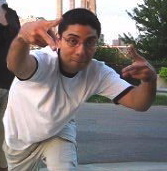 Daniel is a Mexican American Graduate Student at Missouri University. Daniel is the self-proclaimed token minority at MU.from his blog
Daniel is a Mexican American Graduate Student at Missouri University. Daniel is the self-proclaimed token minority at MU.from his blog
- Next, let's talk about Jewish people. Actually, wait a minute. Let's not. Cause I don't really know many Jewish people. However, a new study released by the American Jewish Committee indicates that Hispanics harbor more anti-Semitic feelings than non-Hispanics. So, according to the "research", I guess I'm supposed to hate Jewish people. Now (sigh).....I don't mean to debunk anyone's intellectual efforts here, but I don't think it's fair to Jewish people or Hispanics to waste time on such mindless activities like being anti-Semitic. It's pointless. It's ignorant. It's un-American. SO, let's not hate Jewish people.... let's hate WHITE people. If you ask me, it's completely unnecessary to begin dividing up white folks into groups and hating them by ethnicity. We should unify and hate them all equally. (Okay, you idiots. I hope you realize I'm joking here.)
This video was my first introduction to theMULatino.[youtube=http://www.youtube.com/watch?v=y0a4dJGRD9g]after seeing that hilarious video and reading his blog I had no choice but to post a response video.[youtube=http://www.youtube.com/watch?v=ENqJhrW0opI]To get the ball rolling I asked them to answer the following questions:
- Where you see yourself going?
- What is your goal as an artist/educator/politician/writer...?
- In what facets (if any) do you plan on serving the latino and or jewish community?
- What do you hope to achieve using the internet as a means of communication?
- What do you want people to know about you?
- As a minority (that is a public figure), who is more effective in creating change?
Intellectuals, Comedians, Artists
- How are they representatives of our society?
- Who actually sees their work?



 [youtube=http://www.youtube.com/watch?v=b1ETIAoRbm4] [youtube=http://www.youtube.com/watch?v=1mu_a69i1G0][youtube=http://www.youtube.com/watch?v=7ZOp8BKaccs]
[youtube=http://www.youtube.com/watch?v=b1ETIAoRbm4] [youtube=http://www.youtube.com/watch?v=1mu_a69i1G0][youtube=http://www.youtube.com/watch?v=7ZOp8BKaccs] - Ricardo's Responses:
- I really hope to see myself in a position that I can write and direct my own films. When I sit down to write something I try and tell a story on how we, as people, use all the wrong ways to move and affect each other as opposed to honestly and openly communicating. To do the former is pave the way for a small scale but devastating human disaster. This is where the drama comes in and these dramas, these mini tragedies, are happening all around us each day. They go unnoticed because they don't involve a bank robbery or high speed chase, but there is great emotion and compelling stories in these events none the less. These are not easy targets to hit when doing a screenplay or the like but they are challenging.
- In terms of serving the Latino community, I want to be able to show people out there that all of us have stories to tell that are universal in their appeal. While there will be Latino artist that contribute to breaking down racial barriers by doing race oriented fare, I want to do that by telling stories that transcend race. I want the fact that I'm Latino to be an afterthought because that means, to me, that they've accepted me as an individual and artist. And I think that's happened to a great extent on my blog. It's a very diverse group of readers that relate to the story. I'm not a gang member and I'm not going to steal your car. I'm a guy that thinks and works for a living just like you.
- As for the Jewish community, I want to show people that we too have the same hopes and fears as everyone else and we're not out to take everyone's money or control the media or whatever conspiracy theory of the day is out there. Again it goes back into the types of stories we tell and how we frame them. One day I'd like to be able to do a documentary that shows and how it's like to be Jewish in America. All of us are not doctors and lawyers and all of us are not loaded. You're a minority but not really a minority because people perceive that you have money and that cancels it out. But that's the great myth. Being Jewish is about not fitting in and loving it. There's got to be a way that I can show that.
- I think you need the Jon Stewarts, Dave Chappelles AND the Guillermo Gomez Pena/ Coco Fuscos of the world out there grinding it out. The approaches are different but there's a lot of truth in each approach. These are the people that tap you on the shoulder and say "What you think is acceptable is really fucked up and here's why." And they show us this through their mediums and it hurts sometimes. These people shock you into looking at your reality in a new way and make you think.
- Humor is such a powerful and healing thing. I told you about about shocking people before but if you can get them to laugh at the shock then your on your way to enlightening some people. The laughter in a strange way is an acknowledgment. if they can acknowledge the issue then they can be moved toward learning more about it and possibly fixing it.
Daniel's Responses:
- To answer some of your questions the best I can, I think I first have to confess to honestly feeling like my life is a work in progress. I don't always know what I'm doing. In fact, 99% of the time I don't even know what I'm going to write or say until I actually do it. Being a writer and a student is just a natural extension of my process of self-discovery and my interest in sharing. I've worked in diversity in higher education since I was undergraduate, so that's mainly my writing content now. However, the more years I put in, the more I've realized that while the thrust of institutional diversity is positive, it's a political showman's game just like everything else. At this point, I know that I'm paid to write, publicize, and document nice news, not real news. My goal with my writing is to someday have the financial stability to write something truthful that I don't have to be concerned about getting fired over.
- My ethnic background is Latino, Hispanic, Chicano, and I grew up poor (who didn't?) in Kansas City. My parents were Chicano activists in the sixties and seventies when they met in college. They're both civil servants today. Although they're divorced now, we all still live in the same neighborhood, except that I'm finishing up graduate school in Columbia, Missouri. My entire life has always included some element of community activism, so I really felt like a fish out of water when I moved to middle-Missouri. My long-term plan has always been to eventually head back home and participate in making my community a better place (aren't I noble? barf). However, right now I have some more learning to do, things to see, people to meet, experiences to go through, you know the deal. I'm just trying to make the most of everything.
- I think that's what my website is about; sharing, learning, exercising intellectual freedom, making the most of this experience, and not losing touch with my community back home. If I wanted people to know anything about me, it would probably just be that the irony inherent in that particular question is that I'm really just trying to learn about them.
please feel free to share your responses
Obsessed With Frida Kahlo
obsessed with frida kahlo, 2007
[youtube=http://www.youtube.com/watch?v=rxqo7aJtD0U]
el es frida kahlo, 2007
[youtube=http://www.youtube.com/watch?v=xlMPoFXRT18]
part of the piece I did for d[x]i magazine on the commodification of Frida Kahlo
auto retrato, 2003
frida painting, 2007
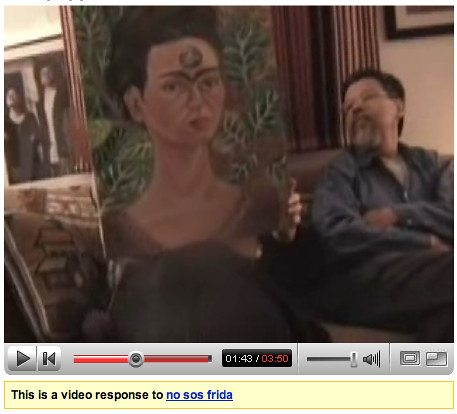
frida puppets, 2007
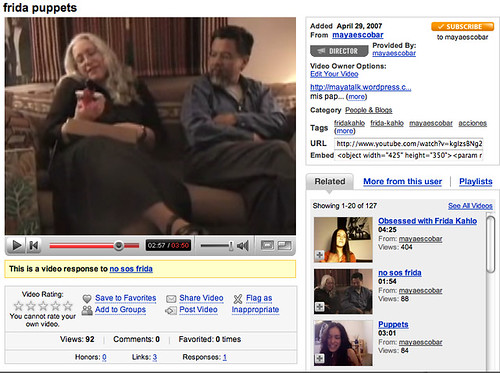
[youtube=http://www.youtube.com/watch?v=QzqBX0HoPSo]
In search of the #1 Frida Kahlo fan in the World

PROVE IT answer the following questions:
When did you fall in love with Frida?
Why do you admire her?
What trivia do you know about Frida Kahlo?
How many and what Frida objects do you own? (prints of her work, t-shirts, mugs, wall hangings, toothbrushes, etc...)





please leave a written comment, submit photos, or a video responseDressed as Frida
your responses
RELATED POSTSGallery OpeningNext Phase of Acciones PlasticasVideo ResponsesHow does it feel to be called a JAP? Now I am asking you to participate. Hopefully viewing these images has caused you to question if and when similar stereotypes have been applied to you or those around you. Please take the time to share your experiences by clicking on any of the dolls to submit your response.



 I have included a section with guiding questions. If you have more you would like to submit post them herePlease feel free but not limited to answering the following questions regarding each doll:
I have included a section with guiding questions. If you have more you would like to submit post them herePlease feel free but not limited to answering the following questions regarding each doll:
Is there any truth to this description?Are all of these things negative?What is the origin of this stereotype?What is a _________ really like?What does this stereotype leave unsaid?
[youtube=http://www.youtube.com/watch?v=wBkROAn7efM][youtube=http://www.youtube.com/watch?v=-kohK1qimhI][youtube=http://www.youtube.com/watch?v=4Zsr4NmtG0I]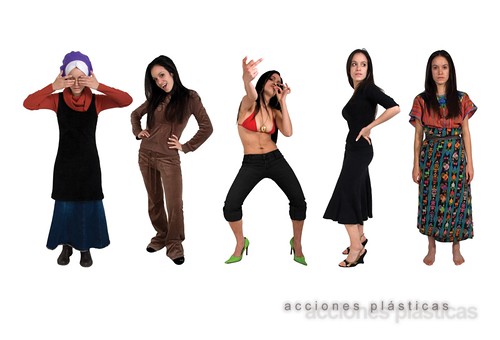
How does it feel to be called a JAP?
 Please take this as an opportunity to let your voice be heard. I welcome anyone who would like to offer a response online, either written or in the form of a video blog. Remember that the acciones plásticas videos are not the stereotypes themselves, they are women who have be affected by their presence.I will continuously update this post with videos as they are submitted. "How does it feel to be called a _____?" Feel free, (but not limited) to respond to the stereotypes I have presented. Use this as an opportunity to share your own experiences.If you are an educator takes this as an opportunity to discuss these issues with your students. I am in the process of developing curriculum for presenting acciones plásticas in the classroom.
Please take this as an opportunity to let your voice be heard. I welcome anyone who would like to offer a response online, either written or in the form of a video blog. Remember that the acciones plásticas videos are not the stereotypes themselves, they are women who have be affected by their presence.I will continuously update this post with videos as they are submitted. "How does it feel to be called a _____?" Feel free, (but not limited) to respond to the stereotypes I have presented. Use this as an opportunity to share your own experiences.If you are an educator takes this as an opportunity to discuss these issues with your students. I am in the process of developing curriculum for presenting acciones plásticas in the classroom.

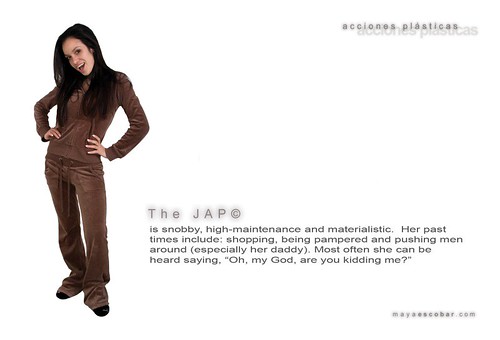
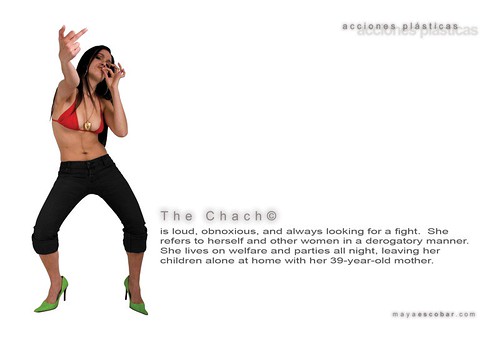
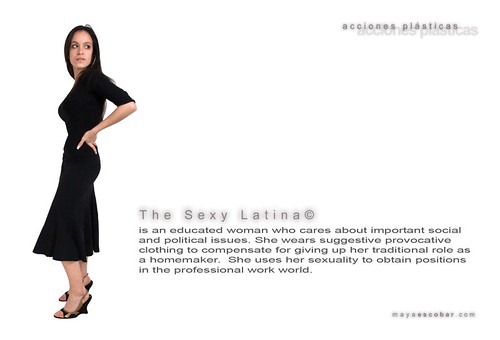
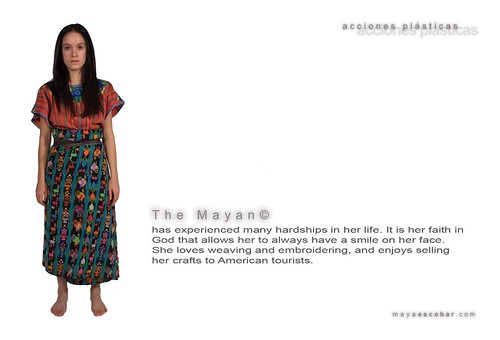
while the "youtube" video blogs are played on a reel.


 The public will be invited to respond, by altering the text accompanying each doll. Over the course of the exhibition the original cards displaying the stereotype will be replaced by the new cards with altered text.Your video responses will be incorporated into the reel. From the show Now I am asking you to participate. Hopefully viewing these images has caused you to question if and when similar stereotypes have been applied to you or those around you. Please take the time to share your experiences by clicking on any of the dolls to submit your response.
The public will be invited to respond, by altering the text accompanying each doll. Over the course of the exhibition the original cards displaying the stereotype will be replaced by the new cards with altered text.Your video responses will be incorporated into the reel. From the show Now I am asking you to participate. Hopefully viewing these images has caused you to question if and when similar stereotypes have been applied to you or those around you. Please take the time to share your experiences by clicking on any of the dolls to submit your response.



 I have included a section with guiding questions. If you have more you would like to submit post them herePlease feel free but not limited to answering the following questions regarding each doll:
I have included a section with guiding questions. If you have more you would like to submit post them herePlease feel free but not limited to answering the following questions regarding each doll:
Is there any truth to this description?Are all of these things negative?What is the origin of this stereotype?What is a _________ really like?What does this stereotype leave unsaid?
 [youtube=http://www.youtube.com/watch?v=-kohK1qimhI][youtube=http://www.youtube.com/watch?v=4Zsr4NmtG0I]
[youtube=http://www.youtube.com/watch?v=-kohK1qimhI][youtube=http://www.youtube.com/watch?v=4Zsr4NmtG0I]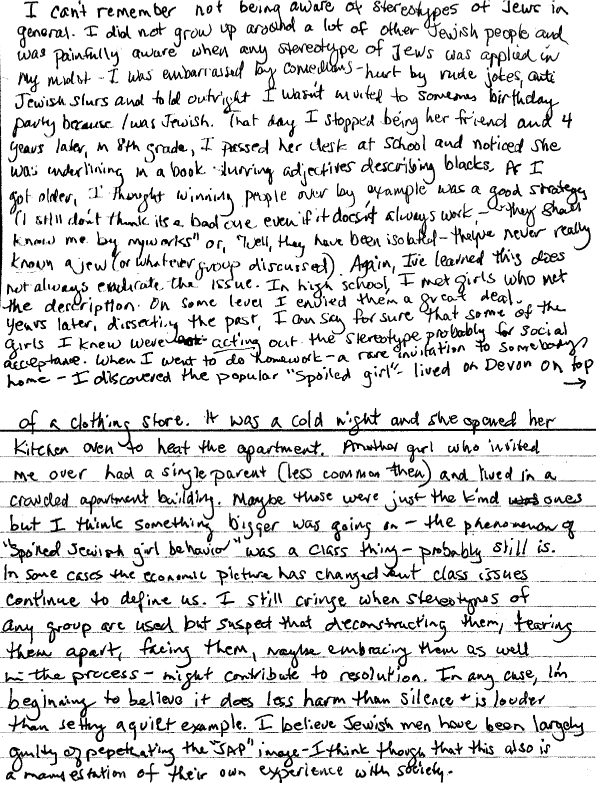

The JAP©
from the series acciones plásticas

[youtube=http://www.youtube.com/watch?v=GBjBN0ftcP0]click here for Kol Ra'ash Gadol's critque on Jewschool about this piece.
When Maya Escobar uses this stereotype she may be either mocking it or indulging it - or both - that’s one of the dangers of comedy. She clearly thinks that she’s mocking it, and attempting to provide a conversation starter (Okay, Maya, so here I am starting a conversation: Kol hakavod!) But even in her attempts to mock the stereotypes that have been projected onto her (and let’s be clear the chach and the sexy latina aren’t any better!), I have to wonder about those who are watching the comedy, and whether it helps them reject - or accept- those experiences in which they met a person onto whom they themselves projected such a label. “After all, how can she “nail the JAP” if there’s no JAP to be nailed, if the JAP happens to simply be a person whom one dislikes upon meeting, but no more likely a Jew than a Lutheran? In order for it to confirm that glorious feeling, one has to have a little sense that there is something about being Jewish and female that attaches to that kind of behavior, n’est ce pas?
she offers the following linksan exerpt from Dr. Evelyn Torton Beck’s essay "From ‘Kike to Jap’:How misogyny, anti-semitism, and racism construct the Jewish American Princess."bibliography of the analysis of the JAP stereotype www.lilith.org/landmark_articles/jap.pdf




